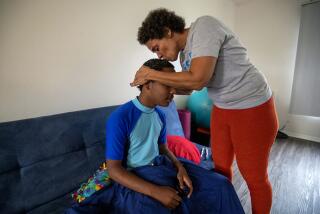Mother Faces Her Toddler’s AIDS With Faith, Not Fear
- Share via
When Sophia saw the numbers in the newspaper, she knew she was alone. There had been five children with AIDS in the city, and now there was one--the one asleep in the next room.
“It’s been a month since I’ve cried about him,” Sophia said of her 3-year-old son, Alonzo. She fingers the brim of her red straw hat, leans across the kitchen table and talks about being a single mother with a child suffering from acquired immune deficiency syndrome.
“Some nights, he used to get up and be in a lot of pain. You just rock him, and he’d cry,” she said. “But he hasn’t been that way for a while. He’s happy, smiling more. So I just believe he’s going to get well.”
She knows that her faith sets her apart. So few people understand, and so many are afraid.
Fears for Daughter
That is why she doesn’t want her real name used and why she refused to tell her story on national television when other mothers of AIDS children were speaking out. She doesn’t want to take the chance that people will overreact and throw her 6-year-old daughter out of school.
“Just a few very close friends know, people who will understand and not get scared,” she said. “You have some people who are really scared.”
Fear is not Sophia’s style. She came to this corner of West Hollywood from the Bahamas via Atlanta and Miami. She is 30, the oldest of six, a twice-weekly churchgoer. Responsibility and spirituality have made her strong.
Her dark-eyed son, born Aug. 17, 1982, in the 26th week of her pregnancy, seems to have inherited his mother’s strong character. He weighed 1 pound, 3 ounces at birth and spent four months in a neonatal care unit but emerged as a normal child troubled only by the chronic lung problems common to premature babies.
Tainted Transfusion
Doctors believe that sometime in that period, he received a transfusion of AIDS-contaminated blood.
The ailment didn’t show up until October, 1984, when Alonzo was in a car accident. Strapped into his car seat, Alonzo seemed uninjured. But in November, he stopped walking. In December, he began having high fevers and severe ear infections that defied antibiotics. In January, he stopped talking and was hospitalized.
“They had doctors coming in from all over, and none of them could tell us what was wrong with him,” Sophia said. “All they knew was what he didn’t have.”
In the hospital, an intravenous needle had been inserted into Alonzo’s foot, as is customary with young children. Fluid from the IV leaked into tissue surrounding a vein, causing problems that required surgery and a skin graft.
Could Barely Move
The emergency seemed to steal the child’s remaining strength, Sophia said. He could barely move, and he had to be fed through a tube.
In May, the doctors said Alonzo had AIDS.
“It was shocking,” Sophia said. “I just couldn’t believe this was happening to my child. This was a little boy who used to walk, talk, play, run around. He was such a happy little baby. You know, if you had a child who was sick from the beginning, then I guess it wouldn’t hurt as much. It really hurts to know that this child used to walk, used to talk. And now he can’t do anything anymore.”
Alonzo was in the hospital from January until April. When he came home, Sophia quit her job as a doctor’s receptionist and tried to care for him herself, getting up every hour or so to feed him through a stomach tube or give him medicine.
In the second week, the hospital arranged for nurses to come in, first for 16 hours a day, now around the clock. Health insurance from the boy’s father covers the bills. But it is Sophia who pays the emotional price.
“I try to make life as good for him as I can. He doesn’t ever see me moping or being sad,” she said. “We play with him, and laugh and talk. I read to him and take him out on walks, in his special chair.”
Alonzo sleeps, breathing in quick rasps, one tiny swollen foot resting on a pillow. He opens his eyes and begins to whine. His mother rubs his leg, but he will not be soothed. She straps him into his stroller, and he calms down when she wheels him into the steamy sunshine of the Southern California afternoon.
“I’m very spiritual, and I truly believe that one day, he’s going to be healed,” she said. “You can’t stay angry. It’s better to forgive and forget than to resent and remember, because it will make you go crazy.”
More to Read
Sign up for Essential California
The most important California stories and recommendations in your inbox every morning.
You may occasionally receive promotional content from the Los Angeles Times.










